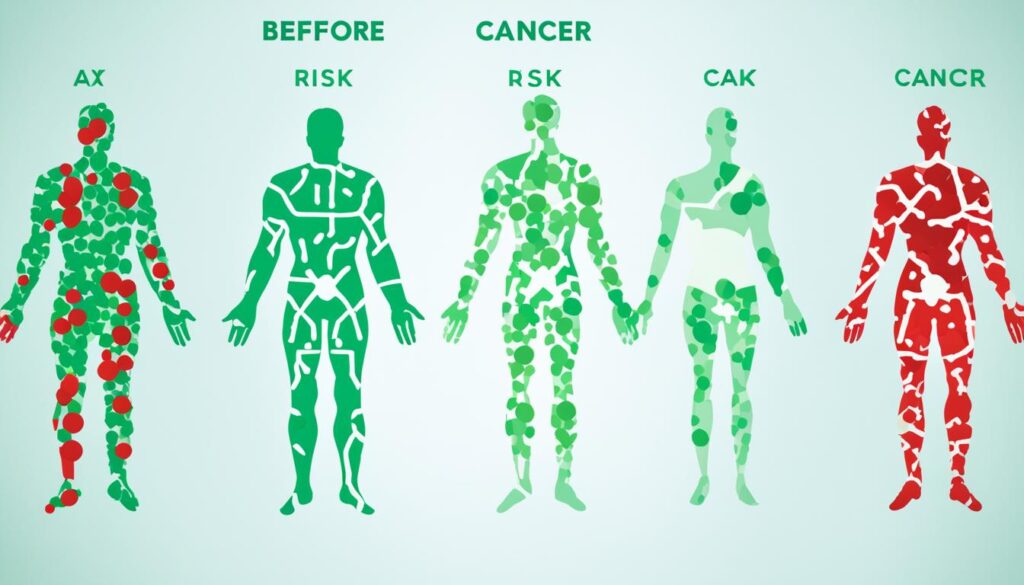Can shedding those extra pounds really help prevent cancer? It’s a question that has puzzled many. While we often associate weight loss with cosmetic goals or general health improvement, the impact it can have on reducing the risk of cancer is often overlooked.
In this eye-opening article, we dig deep into the connection between weight loss and cancer prevention, uncovering the facts that will change the way you think about weight management. Prepare to be amazed!
Weight loss has long been hailed as a powerful tool for improving overall health and reducing the risk of chronic diseases. But when it comes to cancer, does shedding those unwanted pounds truly make a difference? Can weight loss be a potential ally in our battle against this deadly disease? Let’s find out.
Key Takeaways:
- Weight loss can potentially decrease the risk of developing certain types of cancer.
- Obesity is strongly linked to an increased risk of cancer.
- Large cohort studies provide evidence of the correlation between weight loss and reduced cancer risk.
- Understanding the biological mechanisms connecting obesity and cancer is crucial.
- Intentional weight loss and maintaining a healthy weight can play a significant role in cancer prevention.
Understanding Obesity and its Impact on Health
In today’s society, obesity has become a major health concern with widespread implications. Understanding the relationship between obesity and overall health is crucial for both individuals and public health initiatives.
This section will provide a comprehensive overview of obesity and its impact on health, exploring various aspects including body mass index (BMI), obesity categories, prevalence in the United States, and the relationship between body fat distribution and disease risk.
Defining Body Mass Index (BMI) and Obesity Categories
Body Mass Index (BMI) is a widely used tool to estimate an individual’s body fat based on their height and weight. It is calculated by dividing a person’s weight in kilograms by the square of their height in meters.
BMI helps classify individuals into different obesity categories, providing a general framework for assessing the level of risk associated with excess body weight. The table below showcases the different BMI ranges and their corresponding obesity categories:

| BMI Range | Category |
|---|---|
| Below 18.5 | Underweight |
| 18.5 – 24.9 | Normal Weight |
| 25.0 – 29.9 | Overweight |
| 30.0 – 34.9 | Obesity Class I |
| 35.0 – 39.9 | Obesity Class II |
| 40.0 or higher | Obesity Class III |
Prevalence and Trends of Obesity in the United States
Obesity has reached epidemic proportions in the United States, with significant implications for public health. According to the Centers for Disease Control and Prevention (CDC), the prevalence of obesity in the United States has been steadily increasing over the past few decades.
As of 2020, approximately 42.4% of adults in the country were classified as obese. This alarming trend highlights the urgent need for effective strategies to combat obesity and its associated health risks.
Relationship Between Body Fat Distribution and Disease Risk
While BMI provides a general indication of excess body weight, the distribution of body fat also plays a crucial role in determining the risk of various diseases.
Research suggests that individuals with excess abdominal fat, also known as central obesity, are at a higher risk of developing chronic conditions such as type 2 diabetes, cardiovascular disease, and certain types of cancer. This is because abdominal fat is metabolically active and releases inflammatory substances that can disrupt normal bodily functions.
Understanding the relationship between body fat distribution and disease risk is vital for targeted intervention and prevention strategies. The next section will explore the link between weight loss and cancer risk reduction, shedding light on the importance of maintaining a healthy weight for overall well-being.
Does weight loss decrease cancer risk?
The link between obesity and increased cancer risk has been a topic of significant research and discussion. Evidence from large cohort studies has revealed a correlation between obesity and higher rates of cancer. This finding has far-reaching implications for weight loss and cancer risk reduction.
Multiple studies have shown that obesity is linked to an increased incidence of various types of cancer, including **linking obesity to increased cancer risk**.
Research conducted with large groups of participants over extended periods of time provides robust evidence of this connection. These studies have consistently demonstrated a higher prevalence of cancer among individuals with higher body mass index (BMI) and excess body weight.
One such study, conducted by the World Cancer Research Fund, analyzed data from over 200,000 individuals and found that excess body weight was responsible for around 12% of all cancer cases in the United States, **evidence from large cohort studies**.
The study also revealed that obesity increased the risk of developing several types of cancer, including breast, colorectal, pancreatic, kidney, and ovarian cancer.
The findings from these large cohort studies highlight the importance of weight loss in reducing the risk of cancer. Shedding excess weight can help improve overall health and significantly lower the likelihood of developing obesity-related cancers.
However, it’s crucial to note that weight loss should be achieved through sustainable means that promote long-term health.

Implementing healthy habits, such as a balanced diet and regular exercise, is key to achieving successful weight loss and reducing the risk of cancer.
These lifestyle changes not only contribute to weight management but also have indirect effects on cancer prevention. Engaging in physical activity and consuming nutrient-dense foods can help regulate hormonal balance, lower inflammation levels, and improve overall immune function, **weight loss and cancer risk reduction**.
It’s important to remember that weight loss alone may not guarantee an elimination of cancer risk, but it can significantly reduce the likelihood of developing obesity-related cancers. By understanding the link between weight loss, obesity, and cancer risk, individuals are empowered to make informed decisions about their health and take proactive steps towards a healthier lifestyle.
Examining the Biological Mechanisms Connecting Obesity and Cancer
Understanding the biological mechanisms that connect obesity and cancer is crucial in comprehending the complex relationship between these two conditions. Various obesity-related factors contribute to the development of cancer, highlighting the need for a deeper exploration of the underlying biological processes.
Hormonal imbalances play a significant role in the link between obesity and cancer. Excess body fat can lead to increased production of hormones such as insulin, estrogen, and leptin, which can promote the growth and proliferation of cancer cells.
Inflammation is another important biological mechanism connecting obesity and cancer. Chronic low-grade inflammation, often observed in obese individuals, creates an environment favorable for tumor formation and progression.
Furthermore, adipose tissue, also known as fat tissue, produces several bioactive substances called adipokines. These adipokines can influence various processes involved in cancer development, including cell signaling, angiogenesis, and inflammation.
Research has shown that obesity-related factors can impact multiple pathways involved in cancer initiation and progression. By understanding these biological mechanisms, we can gain valuable insights into the complex interplay between obesity and cancer, ultimately guiding preventive strategies and interventions.
Biological Mechanisms Connecting Obesity and Cancer
| Obesity-Related Factor | Biological Mechanism |
|---|---|
| Hormonal Imbalances | Promotion of cancer cell growth and proliferation |
| Inflammation | Creation of a tumor-friendly environment |
| Adipokines | Influence on cell signaling, angiogenesis, and inflammation |
This table highlights some of the key biological mechanisms connecting obesity and cancer. It showcases how hormonal imbalances, inflammation, and adipokines contribute to cancer development, providing a comprehensive understanding of the intricate relationship between obesity and cancer.
Realities of Weight Loss: Intentions, Patterns, and Cancer Incidence
In order to fully understand the impact of weight loss on cancer incidence, it is important to dissect the relationship between weight loss and cancer diagnoses. Weight loss can occur both intentionally and unintentionally, and the significance of these different patterns should not be overlooked.
Dissecting the Relationship Between Weight Loss and Cancer Diagnoses
The relationship between weight loss and cancer diagnoses is complex and multifaceted. While it is well-established that obesity is a risk factor for various types of cancer, the impact of intentional weight loss on cancer incidence is still an area of ongoing research.
Studies have suggested that intentional weight loss may reduce the risk of developing certain types of cancer, particularly those that are associated with obesity.
However, it is important to note that intentional weight loss does not guarantee protection against cancer. The underlying mechanisms through which weight loss affects cancer risk are still being explored, and individual factors such as genetics and lifestyle choices can also influence an individual’s susceptibility to cancer.
The Significance of Intentional Vs. Unintentional Weight Loss
When considering the impact of weight loss on cancer incidence, it is crucial to differentiate between intentional and unintentional weight loss. Intentional weight loss refers to the deliberate effort to lose weight through methods such as diet, exercise, or medical interventions, while unintentional weight loss occurs without conscious effort.
Intentional weight loss is often associated with a proactive approach to health and wellness, with individuals consciously making lifestyle changes to improve their overall well-being.
On the other hand, unintentional weight loss can be a symptom of an underlying health condition or a side effect of certain medications or treatments.
Both intentional and unintentional weight loss can have implications for cancer diagnosis and prognosis. It is important for healthcare professionals to assess weight loss patterns and consider them in context with other clinical factors when evaluating cancer risk and developing treatment plans.

Impact of Weight Loss Surgery on Cancer Risk
Weight loss surgery has been shown to have a significant impact on reducing the risk of cancer. Bariatric surgery, in particular, has emerged as an effective method for achieving long-term weight loss and subsequently decreasing the likelihood of developing cancer.
When assessing the long-term benefits of bariatric surgery, studies have consistently demonstrated its ability to not only promote weight loss but also reduce the incidence of cancer.
Research has shown that individuals who undergo weight loss surgery experience a substantial decrease in their overall cancer risk, including a lower incidence of obesity-related cancers such as breast, colorectal, and endometrial cancer.
Moreover, there is a clear correlation between the amount of weight loss achieved through surgery and the subsequent decrease in cancer risk.
Studies have found that individuals who undergo bariatric surgery and successfully lose a significant amount of weight are more likely to experience a substantial reduction in their cancer risk compared to those who do not undergo surgery.

This image depicts the positive impact of weight loss surgery on reducing the risk of cancer. It highlights the significant weight loss achieved through surgery and its potential role in decreasing the incidence of obesity-related cancers.
Personal and Public Health Implications of Weight Management
Weight management plays a significant role in cancer prevention and overall health. Maintaining a healthy weight can have substantial personal health implications, reducing the risk of various diseases, including cancer.
It is essential to recognize the impact of weight management on individual well-being and to prioritize it as a vital aspect of self-care.
Weight management also has public health implications. Public health initiatives and policies that promote weight management can contribute to reducing the burden of cancer and other chronic diseases on society.
By implementing strategies that encourage healthy lifestyles and support individuals in maintaining a healthy weight, communities can work collaboratively towards better population health.

In the words of Mahatma Gandhi, “It is health that is real wealth and not pieces of gold and silver.” We must prioritize our health and well-being by adopting sustainable weight management practices and supporting public health efforts that advocate for community-wide wellness.
Weight Loss Strategies Beyond Surgery – Diet, Exercise, and Medication
Exploring Non-Surgical Methods of Achieving Weight Loss
While weight loss surgery can be an effective option for some individuals, there are also non-surgical methods available for achieving weight loss. These approaches focus on implementing lifestyle changes, such as diet modification, exercise, and medication, to promote sustainable weight management and reduce the risk of cancer.

Role of Lifestyle Changes in Cancer Risk Reduction
One of the key aspects of non-surgical weight loss methods is the role they play in reducing the risk of cancer. Research has shown that maintaining a healthy weight through lifestyle changes can significantly lower the likelihood of developing certain types of cancer, including breast, colorectal, and endometrial cancers.
Implementing a well-balanced diet with a focus on nutrient-rich foods, such as fruits, vegetables, whole grains, and lean proteins, can aid in weight loss and provide the body with essential nutrients to support overall health.
Regular exercise, ranging from moderate-intensity activities like brisk walking to more vigorous exercises like running or swimming, can help burn calories and build muscle, further contributing to weight loss.
For some individuals, medication may be prescribed as part of a comprehensive weight loss plan. These medications work in various ways, such as reducing appetite or blocking fat absorption, to assist in achieving weight loss goals. However, it’s important to note that medication should always be used under the guidance of a healthcare professional.
By incorporating these lifestyle changes into daily routines, individuals can take an active role in managing their weight and reducing the risk of cancer. It’s important to consult with healthcare professionals, such as registered dietitians or exercise specialists, to create personalized plans that address individual needs and goals.
| Non-Surgical Weight Loss Methods | Benefits |
|---|---|
| Diet modification | – Promotes healthy eating habits – Supports weight loss – Provides essential nutrients for overall health |
| Exercise | – Burns calories and supports weight loss – Builds muscle and improves overall fitness – Reduces the risk of chronic diseases |
| Medication | – Assists in appetite control or fat absorption – Supports weight loss goals – Requires medical supervision |
Conclusion
After exploring the relationship between weight loss and cancer risk reduction, it’s clear that shedding those extra pounds can have a significant impact on your health. Multiple studies have linked obesity to an increased risk of cancer, making weight loss an important strategy for prevention.
By understanding the biological mechanisms connecting obesity and cancer, we can make informed decisions about our lifestyle choices.
Whether through weight loss surgery, non-surgical methods, or lifestyle changes, the evidence shows that intentional weight loss is crucial in reducing cancer risk. Bariatric surgery has emerged as an effective long-term solution, but it’s important to note that any amount of weight loss can have a positive impact.
By adopting healthy eating habits, engaging in regular physical activity, and, if necessary, seeking medical assistance, we can take control of our weight and reduce our chances of developing cancer.
The personal and public health implications of weight management should not be overlooked. By maintaining a healthy weight, not only can we reduce our risk of cancer, but we can also improve our overall well-being.
It’s not just about looking good; it’s about taking care of our bodies in the best way possible. It’s time to prioritize weight loss as a vital component of our health journey.





